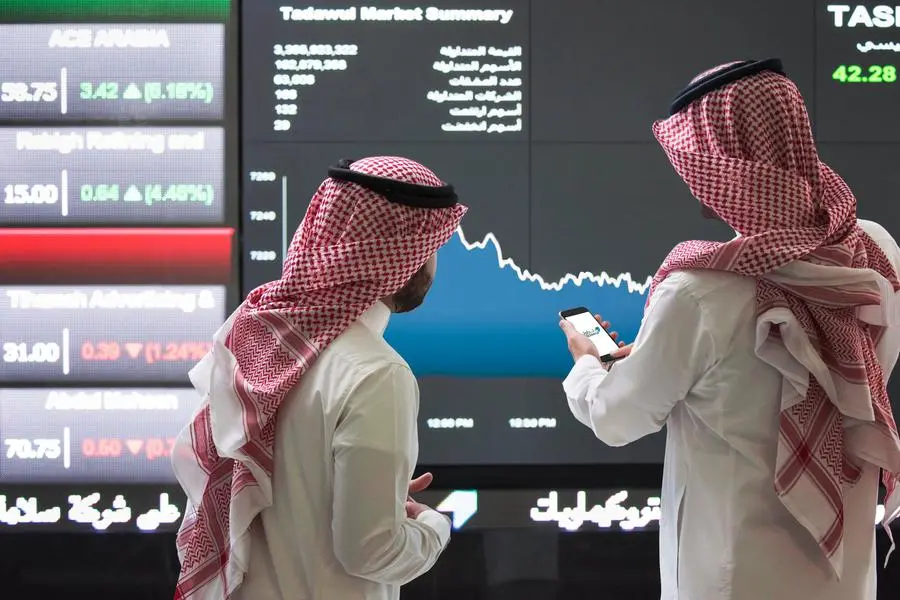PHOTO
Saudi Arabia’s stock market joined the MSCI emerging market (EM) index at the close of the trading session on Tuesday. A total of $40 billion of foreign fund inflows is expected to come into the market from the inclusion, an analyst told Zawya.
The kingdom's stock exchange (Tadawul) is the Arab world’s largest bourse with a total market capitalisation of over half a trillion dollars.
“There has been more than $8.6 billion of foreign inflows into Saudi since the beginning of 2019 and we expect a total of $40 billion to come into the market as a result of Saudi’s inclusion in the MSCI Emerging Markets Index,” Salah Shamma, head of investment, MENA, at Franklin Templeton emerging markets equity, told Zawya by email.
Index compiler MSCI had first announced in June 2017 that it has added the Saudi market to its watch list for a possible inclusion to its emerging market index.
In a press release showing the results of its market classification review in June 2018, MSCI said that the reasons behind its decision to upgrade Tadawul are “the implementation in the Saudi Arabia equity market of a number of regulatory and operational enhancements which effectively increased the opening of the market to international institutional investors.”
Bigger MENA share
MSCI also announced in the press release that Saudi securities will have a weight of approximately 2.6 percent in the MSCI EM index and will be through a two-step inclusion process. First step will take place in May 2019 and second step in August 2019.
“Looking at the MENA region more broadly, we believe Saudi Arabia’s emerging markets status will prove a transformative catalyst for regional exchanges amid rising global investor interest,” Shamma said.
Earlier this month, the index compiler said that it will add 30 Saudi Arabian securities to its EM index at the close of trading on May 28 with a weight of 1.42 percent of the index, the highest in the region.
“To date, the MENA region has accounted for approximately 1.8% of the MSCI Emerging Markets Index, through the UAE, Qatar and Egypt,” he added.
“With Saudi Arabia’s inclusion, that share (MENA) of the index will increase significantly to around 4.5% following the second phase of its inclusion in August.”
As of the end of March 2019, China has the highest weight in the index, with 33 percent, followed by Korea with a 13.02 percent weight and Taiwan with an 11.35 percent weight.
The 4.5 percent weight will give the region a higher weight in the index than Russia, which has a weight of 3.77 percent as of the end of March this year.
Shamma added that the region’s weight would further increase to 5 percent once Kuwait is included in the index.
MSCI said it will include the Kuwait index in its 2019 annual market classification review for a potential reclassification from frontier to emerging market status. The decision will be announced in June 2019. (Read more here)
“Significant liquidity events like these make the MENA region hard for international investors to bypass,” Franklin Templeton’s Shamma ended.
The Saudi index will also be added to the FTSE Russel secondary emerging market index in five tranches. The first of the five tranches was implemented in March 2019, while the last tranche will be added in March 2020. (Read more here)
Valuation
Since the addition to the MSCI watch list on June 20, 2017 until Tuesday May 28, 2019, the Tadawul index has gained more than 20 percent.
However the Saudi index dropped widely in May before the MSCI’s first phase inclusion, falling more than 9 percent, its steepest drop in 2019.
Arqaam Capital said in a note published at the end of 2018 that it “would become tactically cautious” following the first inclusion phase of the Saudi market in the MSCI EM index in May, as it expects “valuations to trade at a significant premium to historical levels and the rest of the EM universe,”
Data from Eikon shows that Tadawul’s price to earnings ratio (P/E) was last at 16.86, compared to 14.84 at the end of the year 2019. A higher P/E means that a stock's price might be high relative to earnings.
(Reporting by Gerard Aoun; Editing by Mily Chakrabarty)
Our Standards: The Thomson Reuters Trust Principles
Disclaimer: This article is provided for informational purposes only. The content does not provide tax, legal or investment advice or opinion regarding the suitability, value or profitability of any particular security, portfolio or investment strategy. Read our full disclaimer policy here.
© ZAWYA 2019





















